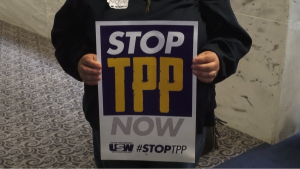The US Steel industry vs the Obama Administrations trade plan
Last year more than twelve thousand steelworkers in the United States were laid off because of unfair trade, illegally imported steel and steel dumping, according to the United Steelworkers Union.
The boom and bust of the steel mining industry is nothing new, it’s a cycle that is anticipated and expected. But the steel industry says it’s up against something bigger now – unfair trade and the Obama administrations trade plan, the Trans-Pacific Partnership (TPP).
“America’s steel sector is under attack by China. Repeated illegal and predatory trade practices have devastated production and employment in steel and many others sectors,” said USW International President Leo Gerard.
So what is the TPP? It’s a trade agreement between twelve countries: the US, Japan, Malaysia, Vietnam, Singapore, Brunei, Australia, New Zealand, Canada, Mexico, Chile and Peru. The goal for the trade agreement is to deepen economic ties between the countries, slash tariffs and foster trade to boost growth. If it is passed, it could create something similar to the EU.
Those opposed to the TPP say they want a level playing field for trade between the U.S. and other countries. China has a surplus of steel, which has led to the country dumping steel at prices the US steel industry can’t compete with, but this isn’t necessarily a new problem.
Those in favor of the agreement argue that it will create new economic growth. U.S. Secretary of Defense, Ash Carter, wrote this in support of TPP in 2015.
“As Secretary of Defense, I never forget that our military strength ultimately rests on the foundation of our vibrant, unmatched, and growing economy. TPP is so important because of its enormous promise for jobs and growth across our nation’s economy,” he wrote. “But TPP also makes strong strategic sense, and it is probably one of the most important parts of the rebalance, and that’s why it has won such bipartisan support.”
But steelworkers argue that their jobs and livelihood are at risk with this trade plan. Vernon Beck has been working in the steel industry for 38 years and is the president of the local USW union in northwest Indiana.
“I’m really confused as to why they’re just allowing our jobs to go overseas. And I don’t understand the legislatures thinking of we’re just letting it happen. It’s one thing to fight and lose, but just to let it happen?”

Northwest Indiana is one of many regions across the country that relies heavily on the steel industry. Mike Wheeler is a steelworker in the region. He said he has seen the effects of illegal trade and the impact it has on communities and the livelihood of an area.
“You take the steel industry away from Northwest Indiana…there’s nothing left of Northwest Indiana,” Wheeler said. One of the longest standing steel mills in his community is shut down. “Right now they are down to 67 people that are losing their jobs, that have been there 30 plus years. And now, they’re out on the street.”
Greg Mastel and Andrew Szamosszego wrote a research paper in February of 1999 titled, “Leveling the playing field: Anti-dumping and the US Steel industry.” They wrote that fair trade is necessary and healthy for the US economy, but if steel dumping continues it will debilitate the steel industry and communities that rely on the economic stability from those jobs.
“Without an assurance that action can and will be taken against trade distorting and illegal commercial practices, investment in and production of steel and many other manufactured products in the United States will become an unattractive proposition,” they wrote. “Over time, the losses to the U.S. economy in terms of lost production, investment, and high-wage jobs, mount to painful levels.”
The Trans-Pacific Partnership has not been passed yet, but Congress has given President Obama the authority to “fast-track” the deal, which gives legislators two options, either accept or reject it.
For steelworkers like Tim Callander this isn’t political, it’s personal.
“We have a lot of steelworkers that live in the communities of Northwest Indiana and if we lose those steel mills, all of those towns are going to be devastated.”

